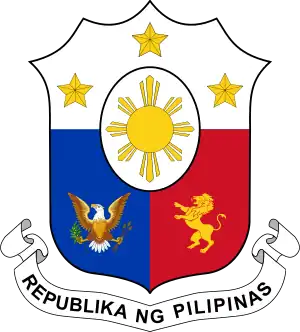1963 Philippine Senate election
A senatorial election was held on November 12, 1963 in the Philippines. The 1963 elections were known as a midterm election as the date when the elected officials take office falls halfway through President Diosdado Macapagal's four-year term.
| ||||||||||||||||||||||||||||
8 (of the 24) seats in the Senate 13 seats needed for a majority | ||||||||||||||||||||||||||||
|---|---|---|---|---|---|---|---|---|---|---|---|---|---|---|---|---|---|---|---|---|---|---|---|---|---|---|---|---|
| ||||||||||||||||||||||||||||
| ||||||||||||||||||||||||||||
The Liberal Party won control of the chamber after having ten seats out of the 24-member Senate, as the 2-member Grand Alliance (the old Progressive Party) were caucusing with them, plus Alejandro Almendras of the Nacionalistas who personally supported Senate President Ferdinand Marcos.
Retiring incumbents
Nacionalista Party
Results
The Nacionalista Party and the Liberal Party each won four seats.
Nacionalistas Arturo Tolentino and Gil Puyat, and Liberal Ambrosio Padilla all defended their seats.
Five winners are neophyte senators. These are Juan Liwag, Gerardo Roxas and Tecla San Andres Ziga of the Liberal Party, and the Nacionalistas' José W. Diokno and Rodolfo Ganzon.
Incumbent Nacionalista senators Eulogio Balao, Roseller T. Lim and Cipriano Primcias Sr., and Rogelio de la Rosa of the Liberal Party all lost.
| 1 | 2 | 3 | 4 | 5 | 6 | 7 | 8 | 9 | 10 | 11 | 12 | 13 | 14 | 15 | 16 | 17 | 18 | 19 | 20 | 21 | 22 | 23 | 24 | |
|---|---|---|---|---|---|---|---|---|---|---|---|---|---|---|---|---|---|---|---|---|---|---|---|---|
| Before election | ‡ | ‡ | ‡ | ‡ | ‡ | ‡ | ‡ | ‡ | ||||||||||||||||
| Election result | Not up | LP | NP | Not up | ||||||||||||||||||||
| After election | √ | * | + | + | * | * | √ | √ | ||||||||||||||||
 |
|---|
|
|
Key:
- ‡ Seats up
- + Gained by a party from another party
- √ Held by the incumbent
- * Held by the same party with a new senator
- ^ Vacancy
Per candidate
| Rank | Candidate | Party | Votes | % | ||
|---|---|---|---|---|---|---|
| 1 | Gerardo Roxas | Liberal | 3,623,385 | 47.0% | ||
| 2 | Arturo Tolentino | Nacionalista | 3,570,619 | 46.3% | ||
| 3 | Jose W. Diokno | Nacionalista | 3,422,828 | 44.4% | ||
| 4 | Ambrosio Padilla | Liberal | 3,384,064 | 43.9% | ||
| 5 | Gil Puyat | Nacionalista | 3,024,995 | 39.2% | ||
| 6 | Tecla San Andres Ziga | Liberal | 3,014,686 | 39.1% | ||
| 7 | Rodolfo Ganzon | Nacionalista | 2,708,385 | 35.1% | ||
| 8 | Juan Liwag | Liberal | 2,704,222 | 35.1% | ||
| 9 | Roseller Lim | Nacionalista | 2,655,866 | 34.4% | ||
| 10 | Cesar Climaco | Liberal | 2,618,152 | 33.9% | ||
| 11 | Vicente L. Peralta | Nacionalista | 2,605,605 | 33.8% | ||
| 12 | Bartolome Cabangbang | Nacionalista | 2,572,830 | 33.4% | ||
| 13 | Manuel Cuenco | Liberal | 2,495,180 | 32.4% | ||
| 14 | Eulogio Balao | Liberal | 2,489,133 | 32.3% | ||
| 15 | Rogelio de la Rosa | Liberal | 2,465,488 | 32.0% | ||
| 16 | Cipriano Primicias Sr. | Nacionalista | 2,422,334 | 31.4% | ||
| 17 | Jacobo Gonzales | Independent | 29,458 | 0.4% | ||
| 18 | Ernesto Bernal | Independent | 3,663 | 0.0% | ||
| 19 | Eulogio Jamolin | Independent | 1,577 | 0.0% | ||
| Total turnout | 7,712,019 | 80.0% | ||||
| Total votes | 45,812,465 | N/A | ||||
| Registered voters | 9,691,121 | 100.0% | ||||
| Note: A total of 19 candidates ran for senator. | Source:[1] | |||||
Per party
 | |||||||||
|---|---|---|---|---|---|---|---|---|---|
| Party | Votes | % | +/– | Seats | |||||
| Up | Before | Won | After | +/− | |||||
| Nacionalista Party | 22,983,457 | 50.17 | +5.10 | 6 | 13 | 4 | 11 | −2 | |
| Liberal Party | 22,794,310 | 49.76 | +11.88 | 2 | 8 | 4 | 10 | +2 | |
| Independent | 34,698 | 0.08 | −0.35 | 0 | 0 | 0 | 0 | 0 | |
| Progressive Party | 0 | 2 | 0 | 2 | 0 | ||||
| Nationalist Citizens' Party | 0 | 1 | 0 | 1 | 0 | ||||
| Total | 45,812,465 | 100.00 | – | 8 | 24 | 8 | 24 | 0 | |
| Total votes | 7,712,019 | – | |||||||
| Registered voters/turnout | 9,691,121 | 79.58 | |||||||
| Source: Dieter Nohlen; Florian Grotz; Christof Hartmann; Graham Hassall; Soliman M. Santos (15 November 2001). Elections in Asia and the Pacific: A Data Handbook: Volume II: South East Asia, East Asia, and the South Pacific. OUP Oxford. ISBN 9780199249596. & Julio Teehankee. "Electoral Politics in the Philippines" (PDF). quezon.ph. | |||||||||
References
- Christof Hartmann; Graham Hassall; Soliman M. Santos Jr. (2001). Dieter Nohlen, Florian Grotz and Christof Hartmann (ed.). Elections in Asia and the Pacific Vol. II. Oxford University Press. pp. 185–230. ISBN 0199249598.

